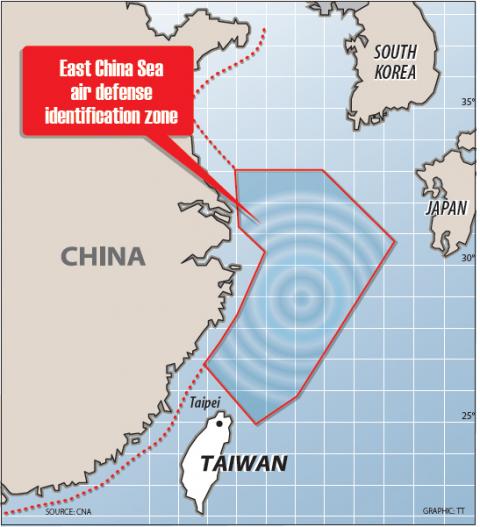Expressing regret that Beijing issued a map earlier in the day of an East China Sea air defense identification zone that includes the disputed Diaoyutai Islands (釣魚台), the Taiwanese government yesterday called on all parties involved to remain calm in dealing with the issue to avoid an escalation of regional tensions.
The islands, known as the Senkaku Islands in Japan, are also claimed by Taiwan and Japan.
China’s ministry of Defense issued a statement on its Web site yesterday regarding the establishment of the zone.

The statement was accompanied by a map and a set of rules regarding the zone, which stated that all aircraft must notify Chinese authorities and are subject to emergency military measures if they do not identify themselves or do not comply with orders from Beijing.
It did not elaborate on the punitive measures, but said the rules went into effect yesterday.
In response, Ministry of National Defense spokesman Major General David Lo (羅紹和) expressed regret over China’s move and said the military would take measures to protect national security and sovereignty in accordance with relevant regulations and rules.
Later yesterday, the National Security Council issued a statement which referred to the East China Sea peace initiative promoted by President Ma Ying-jeou (馬英九) in August last year and called on all parties to show restraint, shelve disputes and work together to develop the resources in the waters around the Diaoyutai Islands through joint efforts.
Commenting on the matter, Democratic Progressive Party Legislator Hsiao Bi-khim (蕭美琴), who sits on the Foreign Affairs and National Defense Committee, called on China not to incite regional tension.
Chinese Nationalist Party (KMT) Legislator Lin Yu-fang (林郁方), who also sits on the legislature’s Foreign Affairs and National Defense Committee, suggested that China’s move was aimed at Japan, as China did not include Taiwan’s Pengjia Islet (彭佳嶼) in its East China Sea air defense identification zone.
Li Fung, a Hong Kong-based Chinese military expert, said that China’s move can be regarded as an effort to bolster Beijing’s sovereignty claims over the islands.
It also showed the Chinese government is preparing for military conflict with Japan over the disputed islands, Li said.
Tensions between China and Japan have escalated after Japan purchased three of the five Senkaku Islands from their private owners in September last year and nationalized them.
This move was seen as undermining a tacit agreement between China and Japan, Li said.
Japan has also taken a similar measure by creating a military identification zone over the disputed islands, Li added.
Since then, China has sent regular coast guard patrols to the islands, which are 200km northeast of Taiwan and 400km west of Japan’s Okinawa.

INVESTIGATION: The case is the latest instance of a DPP figure being implicated in an espionage network accused of allegedly leaking information to Chinese intelligence Democratic Progressive Party (DPP) member Ho Jen-chieh (何仁傑) was detained and held incommunicado yesterday on suspicion of spying for China during his tenure as assistant to then-minister of foreign affairs Joseph Wu (吳釗燮). The Taipei District Prosecutors’ Office said Ho was implicated during its investigation into alleged spying activities by former Presidential Office consultant Wu Shang-yu (吳尚雨). Prosecutors said there is reason to believe Ho breached the National Security Act (國家安全法) by leaking classified Ministry of Foreign Affairs information to Chinese intelligence. Following interrogation, prosecutors petitioned the Taipei District Court to detain Ho, citing concerns over potential collusion or tampering of evidence. The

NEGOTIATIONS: Taiwan has good relations with Washington and the outlook for the negotiations looks promising, Minister of Economic Affairs J.W. Kuo said Taiwan’s GDP growth this year is expected to decrease by 0.43 to 1.61 percentage points due to the effects of US tariffs, National Development Council (NDC) Minister Paul Liu (劉鏡清) said at a meeting of the legislature’s Economics Committee in Taipei yesterday, citing a preliminary estimate by a private research institution. Taiwan’s economy would be significantly affected by the 32 percent “reciprocal” tariffs slapped by the US, which took effect yesterday, Liu said, adding that GDP growth could fall below 3 percent and potentially even dip below 2 percent to 1.53 percent this year. The council has commissioned another institution

NEGOTIATIONS: The US response to the countermeasures and plans Taiwan presented has been positive, including boosting procurement and investment, the president said Taiwan is included in the first group for trade negotiations with the US, President William Lai (賴清德) said yesterday, as he seeks to shield Taiwanese exporters from a 32 percent tariff. In Washington, US Trade Representative Jamieson Greer said in an interview on Fox News on Thursday that he would speak to his Taiwanese and Israeli counterparts yesterday about tariffs after holding a long discussion with the Vietnamese earlier. US President Donald Trump on Wednesday postponed punishing levies on multiple trade partners, including Taiwan, for three months after trillions of US dollars were wiped off global markets. He has maintained a 10 percent

TRADE: The premier pledged safeguards on ‘Made in Taiwan’ labeling, anti-dumping measures and stricter export controls to strengthen its position in trade talks Products labeled “made in Taiwan” must be genuinely made in Taiwan, Premier Cho Jung-tai (卓榮泰) said yesterday, vowing to enforce strict safeguards against “origin laundering” and initiate anti-dumping investigations to prevent China dumping its products in Taiwan. Cho made the remarks in a discussion session with representatives from industries in Kaohsiung. In response to the US government’s recent announcement of “reciprocal” tariffs on its trading partners, President William Lai (賴清德) and Cho last week began a series of consultations with industry leaders nationwide to gather feedback and address concerns. Taiwanese and US officials held a videoconference on Friday evening to discuss the